News
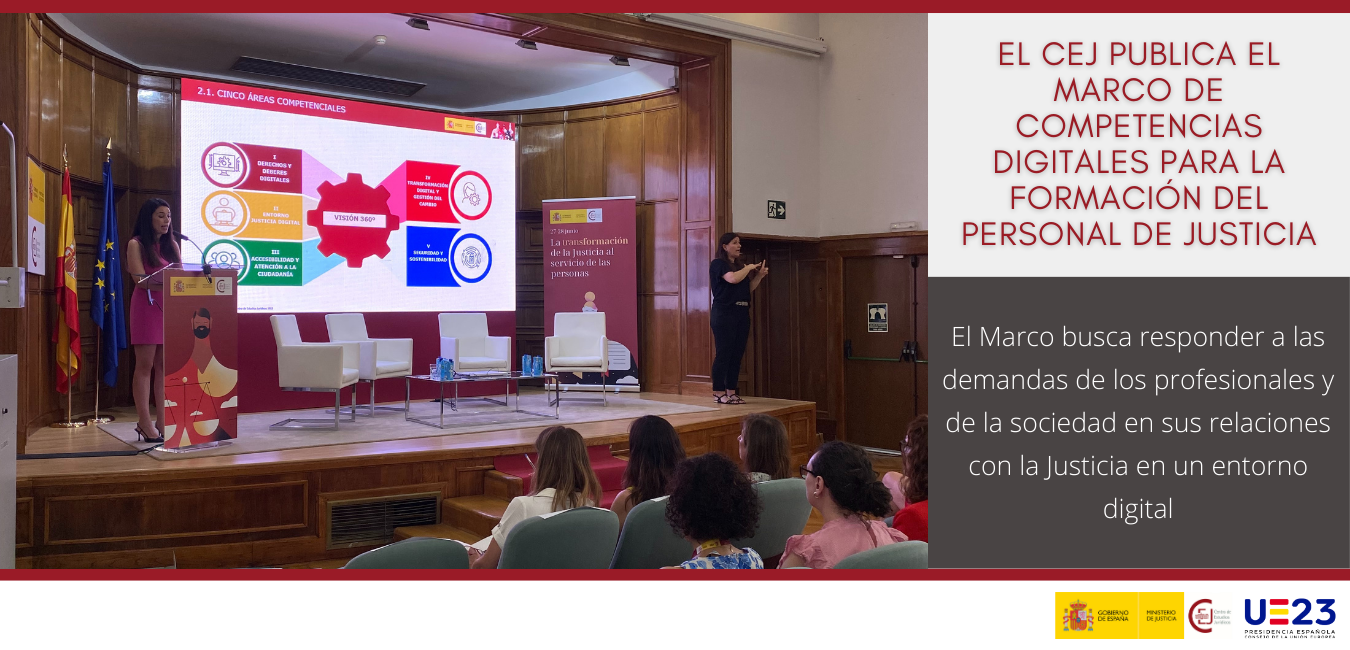
Ya está disponible en la web del Centro de Estudios Jurídicos (CEJ) la publicación oficial del Marco de Competencias Digitales para la formación del personal de Justicia. El documento elaborado por el CEJ se incorpora también al catálogo de publicaciones de la Administración General del Estado, tras expirar el plazo de consulta pública sin registrar ningún comentario a su redacción.
El Marco, que fue presentado en una ponencia durante la III Escuela de Verano del CEJ celebrada entre el 27 y 28 de julio, busca responder a las demandas de los profesionales y de la sociedad en sus relaciones con la Justicia en un entorno digital. Su objetivo es servir como guía de referencia para definir planes docentes en el ámbito de la Justicia. Al mismo tiempo, funcionará como herramienta de autodiagnóstico “para que cada profesional pueda calibrar su nivel de aptitud en las diferentes competencias y, gracias a ello, trabajar en aquellos aspectos que necesite potenciar”. Así lo explicó en su ponencia la subdirectora general y jefa de Estudios del CEJ, Teresa Muñoz-Reja Herrero, quien ha coordinado el documento junto a la directora del Centro, Abigail Fernández González.
El Marco establece las cinco grandes áreas de competencia digital: derechos y deberes digitales; entorno Justicia digital; accesibilidad y atención a la ciudadanía; transformación digital y gestión del cambio en la Administración de Justicia; y la seguridad y sostenibilidad en entornos digitales. Se trata de ámbitos “cuyo desarrollo resulta esencial para todos los operadores y profesionales al servicio de la Justicia”, según la subdirectora general y jefa de Estudios del CEJ.
El documento publicado ahora está en línea con las directrices establecidas en la Estrategia Europea de Formación Judicial 2021-2024, que busca formar y sensibilizar en capacidades digitales con especial hincapié en la protección de los derechos, tanto de personas como de grupos específicos en el espacio digital.
Acceso al Marco de Competencias Digitales para la formación del personal de Justicia
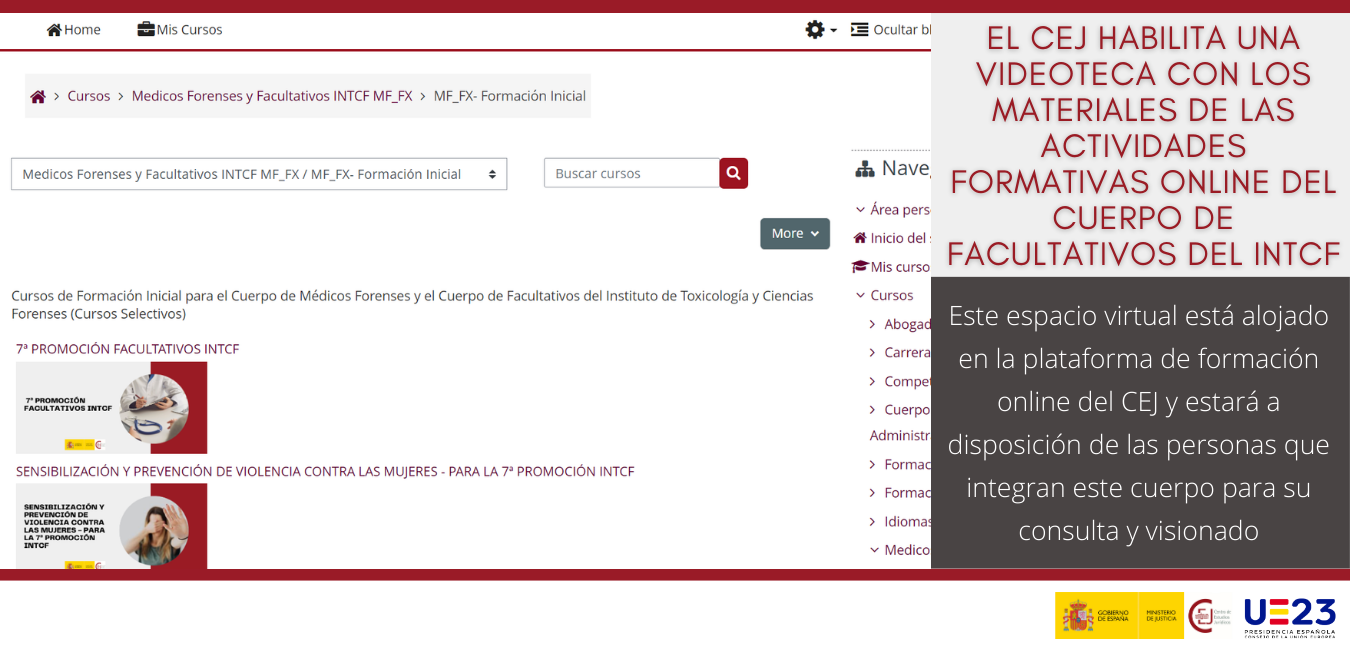
El Centro de Estudios Jurídicos (CEJ) ha creado un repositorio virtual que recopila los vídeos de las actividades online incluidas en los planes de formación continua del Cuerpo Especial de Facultativos del Instituto Nacional de Toxicología y Ciencias Forenses (INTCF).
Este espacio virtual, alojado en la plataforma de formación online del CEJ, estará a disposición de todas las personas que integran este cuerpo para su consulta y visionado, con el fin de enriquecer sus procesos de aprendizaje a la vez que se optimiza la producción y reutilización de recursos públicos.
Para hacer más cómodo su uso, la videoteca se estructura en los mismos ejes formativos que los planes de formación de este cuerpo. Actualmente consta de una selección de vídeos correspondientes al periodo 2021-2023 y se irá completando progresivamente.

El Centro de Estudios Jurídicos (CEJ) ha publicado la resolución por la que se convoca un proceso de selección de participantes de la carrera fiscal en actividades formativas organizadas por el Centro Universitario de la Guardia Civil. Las solicitudes deberán presentarse exclusivamente a través de la página web del CEJ antes del 20 de julio de 2023 a las 14:00 horas (hora peninsular).
En concreto, se ofrece una plaza para el V Curso de Experto Universitario en Investigación de la Ciberdelincuencia, que se desarrollará del 5 de septiembre al 1 de diciembre de 2023 en formato semipresencial, y otra plaza para el VI Máster Universitario en Seguridad Vial y Tráfico, que se impartirá del 12 de septiembre de 2023 al 26 de mayo de 2024, también en formato semipresencial.
El Curso de Experto Universitario en Investigación de la Ciberdelincuencia tiene como objetivo ampliar los conocimientos y mejorar las competencias en la investigación de los delitos tecnológicos en los que se ven implicadas las TIC. La actividad formativa tendrá una duración de tres meses en modalidad semipresencial, con contenidos a desarrollar a través del aula virtual restringida en internet del Centro Universitario de la Guardia Civil (www.cugc.es), complementados por un seminario presencial.
Este seminario presencial tendrá lugar en las instalaciones del Centro Universitario de la Guardia Civil en Aranjuez del 13 de noviembre al 1 diciembre de 2023.
Por su parte, el Máster Universitario en Seguridad Vial y Tráfico persigue incrementar los conocimientos, habilidades y competencias en fundamentos científicos en materia de investigación de siniestros viales y jurídicos. Asimismo, se incluirá formación en materia de Derecho Administrativo, Procesal y Penal de la Circulación, dirección, organización y liderazgo en dispositivos de seguridad vial, por medio de profesores de la Guardia Civil y de la Universidad.
La actividad se impartirá a lo largo de un año académico en modalidad semipresencial, con contenidos a desarrollar a través del aula virtual restringida en internet del Centro Universitario de la Guardia Civil (www.cugc.es). La formación online se verá complementada con tres etapas presenciales, de dos semanas de duración cada una, en los meses de octubre de 2023 (Mérida) y de febrero (Mérida) y mayo (Aranjuez) de 2024.
Estas actividades no están financiadas por el CEJ, por lo que aquellas personas que resulten seleccionadas para participar en ellas deberán asumir los costes que se deriven de su desplazamiento y asistencia a las sesiones presenciales previstas en los correspondientes programas.
Resolución: https://bit.ly/46HhdVr
Preinscripción Curso de Experto Universitario en Investigación de la Ciberdelincuencia: https://bit.ly/3JVQ8Eq
Preinscripción VI Máster Universitario en Seguridad Vial y Tráfico: https://bit.ly/3JW3UGZ
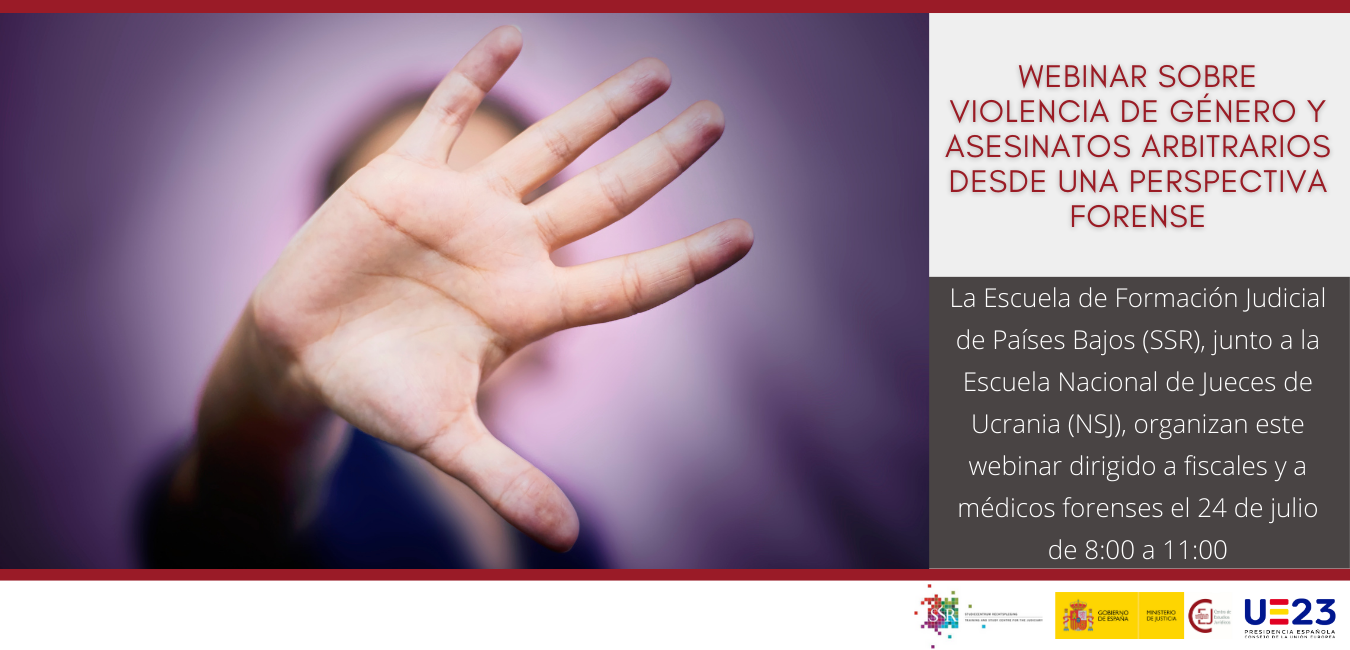
‘Gender-base violence, arbitrary killings and torture-a Forensic Perspective’ es el título del webinar que organizará el próximo 24 de julio de 8.00 a 11.00 (hora española) la Escuela de Formación Judicial de Países Bajos (SSR) junto a la Escuela Nacional de Jueces de Ucrania (NSJ). La actividad formativa está especialmente dirigida a fiscales y también es de interés para médicos forenses. El pre-registro puede realizarse a través de este enlace
El webinar, que se llevará a cabo vía Zoom y en inglés, abordará la violencia de género de carácter sexual, así como los crímenes arbitrarios y la tortura desde la perspectiva de las ciencias forenses. Junto esto, también analizara cómo conducir una investigación y manejar sus resultados en un juicio.
El seminario correrá a cargo de Duarte Nuno Vieira, catedrático de Medicina y Ciencias Forenses de la Universidad de Coimbra, que compartirá sus experiencias trabajando en Ucrania y su papel como consultor para Naciones Unidas.
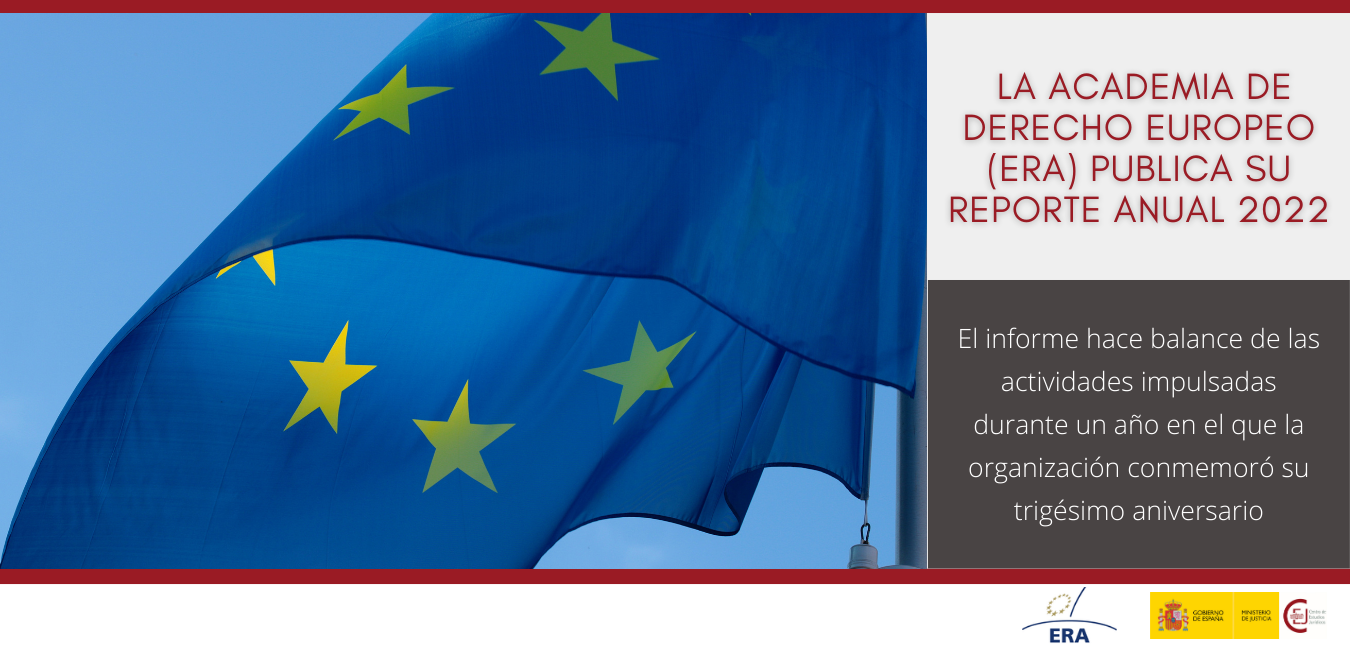
La Academia de Derecho Europeo (ERA), a cuya junta de gobierno pertenece el Centro de Estudios Jurídicos (CEJ), ha publicado su informe anual de 2022. En él se hace balance de las actividades impulsadas durante un año en el que la organización conmemoró su trigésimo aniversario. Una efeméride que festejó con la celebración el pasado mes de octubre del congreso `European Sovereignty: The Legal Dimension –A Union in Control of its own Destiny’.
Este foro concitó en la localidad alemana de Tréveris, sede de la ERA, a 250 representantes de máximo nivel del ámbito jurídico europeo para explorar nuevos retos como la soberanía presupuestaria estratégica y la digital.
Además, la publicación se ocupa de otras iniciativas promovidas por la ERA dentro de su misión de ofrecer formación a jueces, fiscales, abogados y otros profesionales jurídicos y de servir como foro de debate sobre el derecho europeo. Ejemplo de esa labor es el primer evento del ‘EU Forum for the Legal Professions’, un espacio de diálogo donde representantes de diferentes profesiones jurídicas abordaron desafíos compartidos en el ámbito de la Unión Europea.
El informe anual de la ERA también incluye una entrevista a su director, Jean-Philippe Rageade, en la que, entre otros asuntos, explica la respuesta de la entidad ante la invasión rusa de Ucrania y comenta la reelección de la ERA en los órganos de gobierno de la Red Europea de Formación Judicial (REFJ).
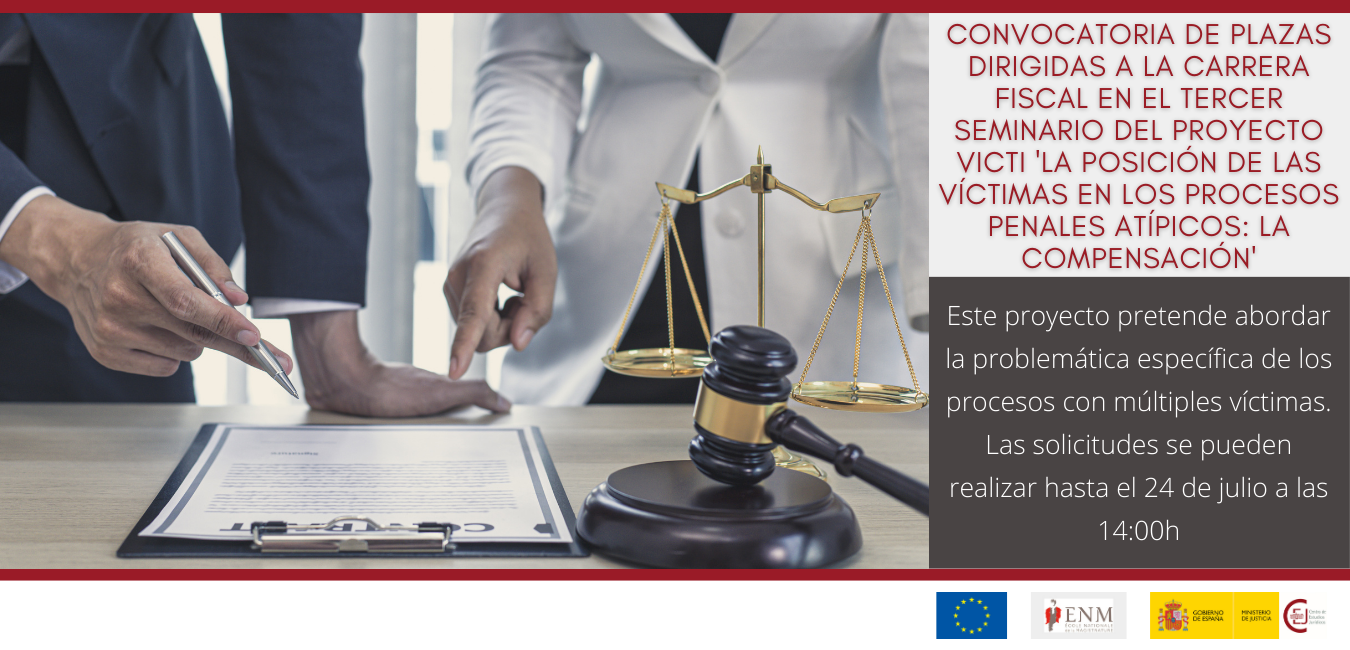
Por resolución de fecha 5 de julio de 2023 se convocan plazas dirigidas a la carrera Fiscal para asistir al tercer seminario del proyecto VICTI, coordinado por la Escuela de la Magistratura francesa, ENM y cofinanciado por la Comisión Europea. Este proyecto pretende abordar la problemática específica de los procesos con múltiples víctimas.
En concreto el seminario convocado tendrá lugar en Nápoles los días 22 a 24 de noviembre, en inglés, francés e italiano, y su título es: “La posición de las víctimas en los procesos penales atípicos: La compensación”
Solicitudes hasta el 24 de julio de 2023 a las 14.00h (hora peninsular) únicamente a través de la sede virtual del Centro de Estudios Jurídicos. No se admitirán solicitudes presentadas por otros medios.
Este seminario se desarrollará en inglés/francés. Por tanto, es requisito imprescindible adjuntar en el momento de la solicitud la acreditación de uno de dichos idiomas en nivel B2 o equivalente. No se admitirán solicitudes que no incluyan dicha acreditación.
Rogamos lean con atención la resolución y en particular las condiciones financieras de participación: el participante gestiona su propio viaje y será indemnizado por la ENM en las condiciones especificadas en el punto séptimo de la resolución. El CEJ emite las comisiones de servicio sin que de esta actividad se derive indemnización alguna por RD 462/2002.
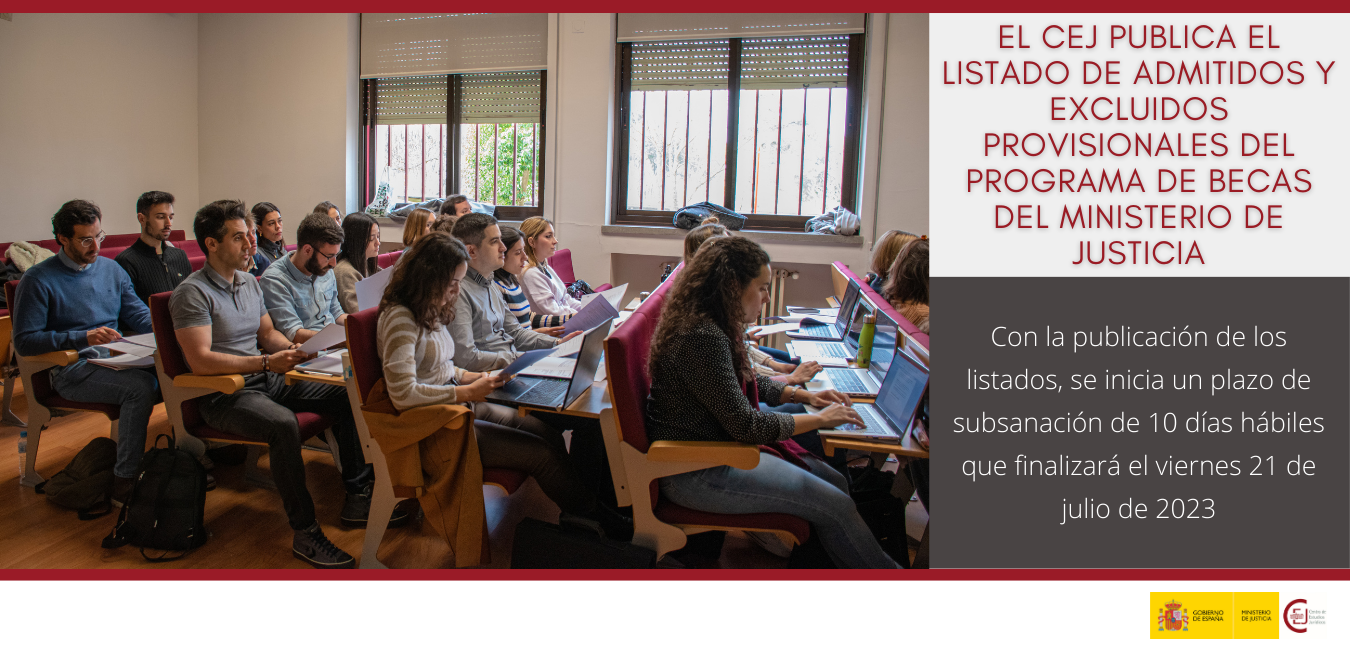
El Centro de Estudios Jurídicos ha publicado el listado de admitidos y excluidos provisionales a las 792 becas para la preparación de las pruebas de acceso a las carreras judicial y fiscal, al Cuerpo de Letrados de la Administración de Justicia (LAJ) y al de Abogados del Estado, para el curso 2023, que en esta ocasión han solicitado 1.188 personas.
Con la publicación de los listados, se inicia un plazo de subsanación de 10 días hábiles que finalizará el viernes 21 de julio de 2023. El listado definitivo admitidos y excluidos, así como el listado provisional de beneficiarios y suplentes se publicará a partir de septiembre. El listado definitivo será público en octubre.
De las 792 becas para este año, 648 corresponden a las pruebas para ingresar en las carreras judicial y fiscal, 120 están destinadas a LAJ y las 24 restantes están dirigidas a los aspirantes a formar parte del Cuerpo de Abogados del Estado.
El importe global de las ayudas, incluidas en el Plan Estratégico de Subvenciones del Ministerio de Justicia 2022-2024, asciende a 5.239.880 euros, lo que supone un importe anual de 6.611 euros por beca.
Esta es la segunda convocatoria que impulsa el Ministerio de Justicia con el objetivo de democratizar el acceso a estos cuerpos y carreras, y eliminar las barreras socioeconómicas que pueden afectar a la preparación de las oposiciones. En 2022 se ofertaron 245 becas, a las que se destinó un presupuesto de 1.619.940 euros.
Puedes consultar el listado provisional y el resto de la información sobre la convocatoria aquí.
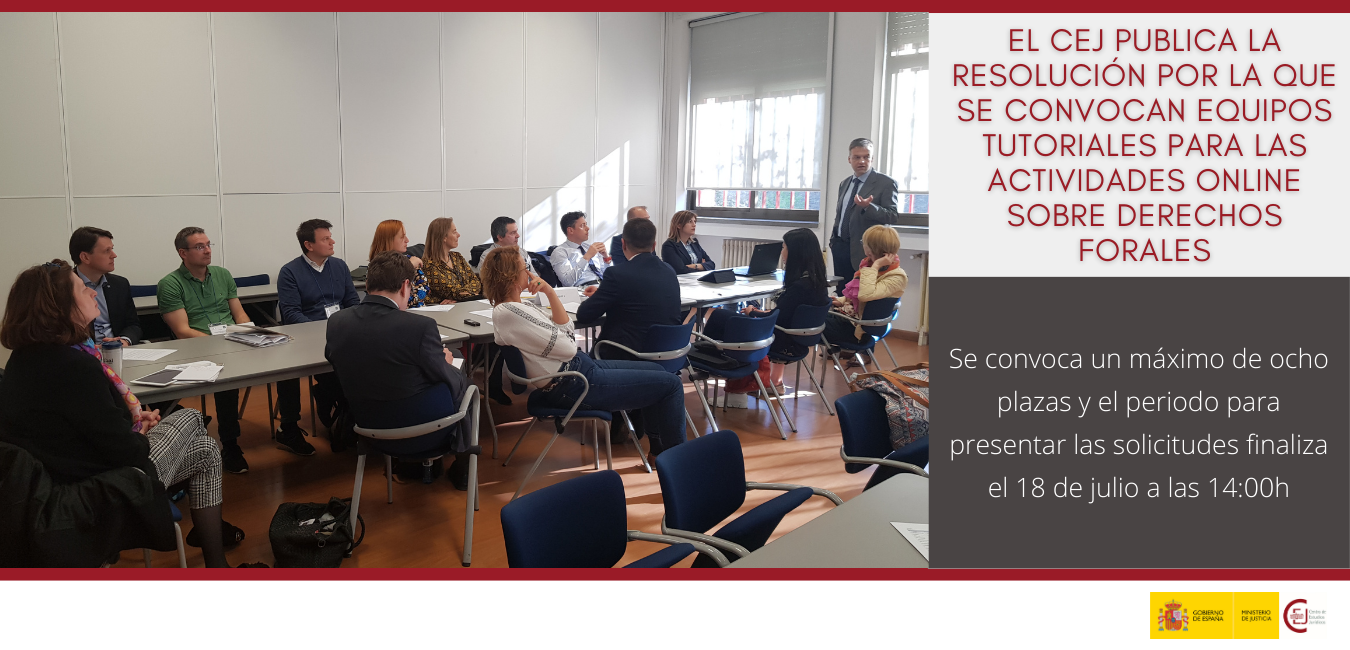
El Centro de Estudios Jurídicos (CEJ) ha publicado la resolución por la que se convocan los equipos tutoriales destinados a las actividades online que imparte sobre los derechos civiles propios de las comunidades autónomas que estatuariamente los poseen. La presentación de solicitudes para integrar los equipos tutoriales de estas actividades, previstas en el Plan Transversal de Formación Continua 2023, deberá realizarse a través de este enlace. El plazo de presentación terminará el próximo 18 de julio a las 14.00h (hora peninsular).
Podrán optar a una de las ocho plazas convocadas como máximo quienes pertenezcan a las carreras judicial y fiscal, al cuerpo de Letrados de la Administración de Justicia, así como cualquier otro cuerpo de la Administración de Justicia o miembros de cuerpos docentes universitarios. Para ello, deben estar en situación de servicio activo y acreditar el conocimiento del derecho propio de la comunidad autónoma para la que se postulen como integrantes del equipo tutorial.
Para la conformación de los equipos tutoriales, el CEJ tendrá en cuenta los siguientes criterios:
1. Conocimiento directo y la experiencia probada de la persona solicitante en la materia por la que opta.
2. Resultado de las valoraciones obtenidas en actividades formativas del CEJ, en el supuesto de que hubiesen actuado como docentes con anterioridad.
3. Además, se valorarán las publicaciones, la antigüedad, la formación y la experiencia docente, en particular en actividades formativas relacionadas con la actividad solicitada.

